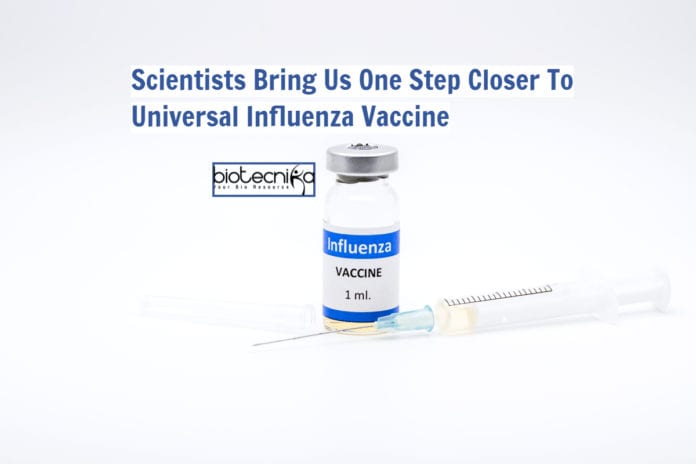Universal Influenza Vaccine; Scientists bring us One step closer
The scourge of the Influenza virus devastates the health and also claims many lives worldwide each year. And it is especially daunting because vaccines are only protective when they are well matched to the strains circulating in the population. But now, a team led by scientists at the Icahn School of Medicine at Mount Sinai is now getting closer to a universal Influenza vaccine using a novel approach they have developed called chimeric hemagglutinin (cHA).
A protein present on the surface of influenza viruses i.e, the hemagglutinin protein, shepherds the virus into host cells. Hemagglutinin protein is comprised of a ‘head’ (variable) & a ‘stalk’ (varies less from strain to strain). Thus, Icahn School of Medicine scientists, led by Peter Palese, Ph.D., Professor & Chair of Microbiology and Florian Krammer, Ph.D., Professor of have focused their efforts on developing an influenza vaccine against the stalk portion of hemagglutinin protein. Their research study, undertaken in collaboration with PATH, an international nonprofit organization, the Cincinnati Children’s Hospital Medical Center, the Duke Early Phase Clinical Research Unit, & the University of Chicago, involved testing of several cHA-based vaccination regimens to see if these would
induce antibodies that can provide broad protection against the influenza virus infections. The study results were published this month in The Lancet Infectious Diseases.The research team including Adolfo García-Sastre, Ph.D., Professor of Microbiology & Director of the Global Health and the Emerging Pathogens Institute at Icahn; Bruce Innis, M.D., Leader, Respiratory Infections & Maternal Immunizations at PATH; Patrick Wilson, Ph.D., Professor of Medicine at the University of Chicago, have together investigated whether several potential cHA-based vaccines for influenza might induce antibodies protection that would target the stalk of group-1 hemagglutinin-expressing influenza viruses. An adjuvant that is an ingredient that boosts the effectiveness of the vaccines, was also part of this testing process.
The Vaccine regimens examined included the following:
1) a group receiving a chimeric H8/1 hemagglutinin-based live attenuated vaccine followed by a boost with a non-adjuvanted chimeric H5/1 hemagglutinin-based inactivated vaccine (IIV),(2) the same regimen but with the IIV having an adjuvant called AS03, and 3) a prime-boost regimen including an adjuvanted cH8/1 IIV prime followed by an adjuvanted cH5/1 IIV boost.
The scientists found that the IIV, but not the live attenuated vaccines, induced a significant antibody response, with a strong increase in anti-H1 stalk titers. Vaccine regimens included in the test induced detectable H1 stalk antibody responses after receiving boosts.
Florian Krammer said the vaccine-induced a broad antibody response which was not only the cross-reactive for the currently circulating human influenza virus but also to the avian & bat influenza virus subtypes. He further added that it was surprising to find that the inactivated formulation with adjuvant-induced a very strong anti-stalk response already after the prime which suggests that one vaccination might be actually enough to induce protection against the pandemic influenza viruses yet to arise. The results indicated that the team is moving towards a universal influenza virus vaccine, but these are still interim results. And additional results will be available upon the completion of the study at the end of this year.
The University of Chicago performed the crucial testing; funding was provided by a grant from the Bill & Melinda Gates Foundation. GlaxoSmithKline had contributed some of the vaccines & adjuvants. Foundational support was provided by the National Institute of Allergy and Infectious Diseases.






























